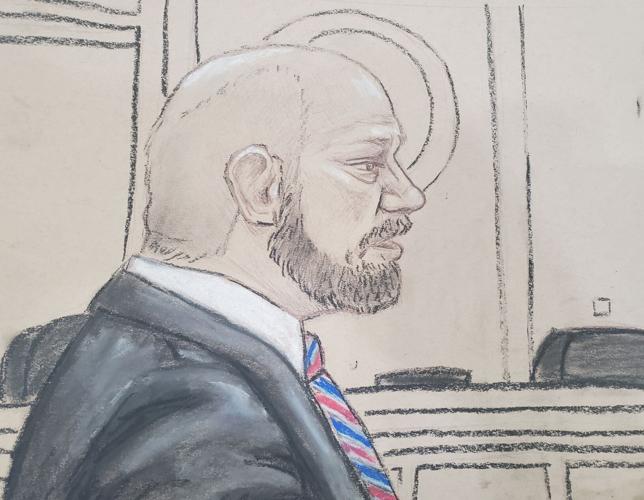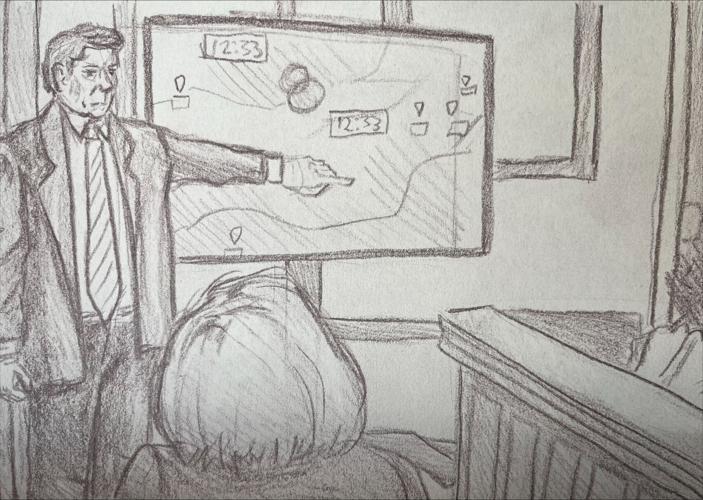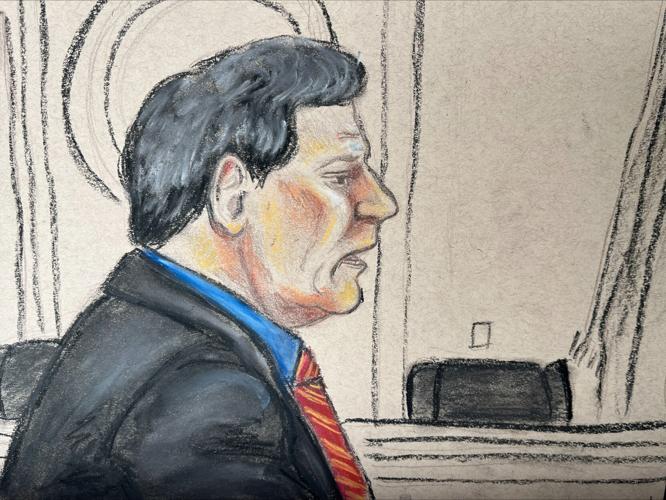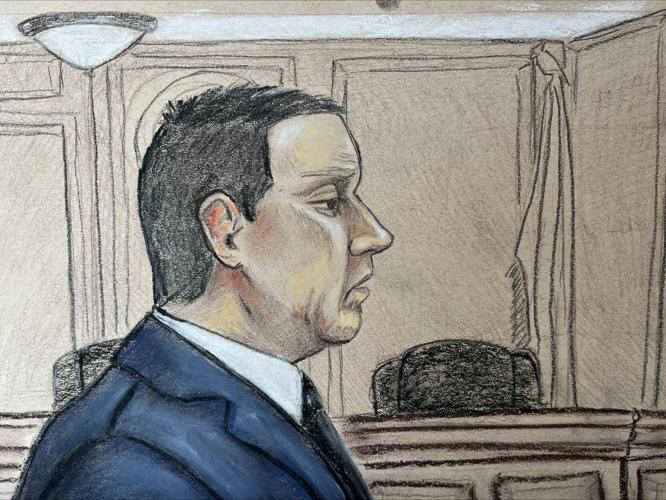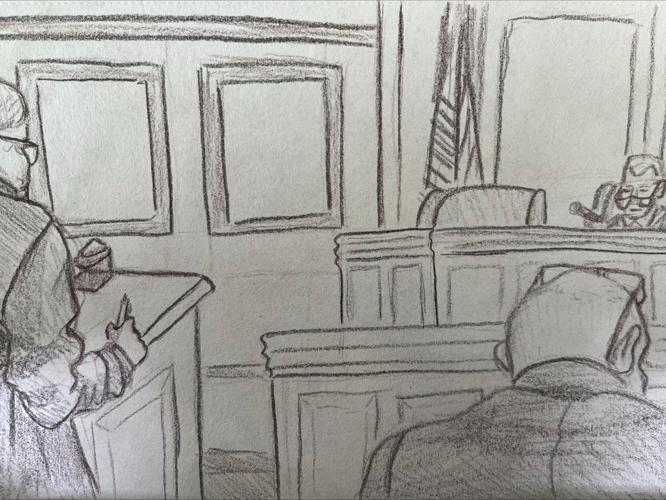BOWLING GREEN, Ky. (WDRB) -- In summarizing the two-week Crystal Rogers murder trial, prosecutor Shane Young tried to keep his conclusion very simple for a Warren County jury.
Brooks Houck, her boyfriend when she disappeared on July 3, 2015, took her to his family's farm for nearly five hours that rainy night on what was supposed to be a special date and she was never seen or heard from again.
"If she does not come home July 3 or early July 4, this man committed murder," Young said, raising his voice and pointing at Houck.
Young pointed out that Houck's version of events given to police for what he did that day was a lie. While saying he'd been driving around doing business July 3, he was actually at the Houck farm most of the day, Young told jurors.
After Rogers disappeared, Houck didn't answer multiple texts and phone calls from her family members but did answer a call from his mother, Rosemary Houck.
Houck had told police when he went to bed after they got home Rogers stayed up playing on her phone. But records show her phone battery died at 9:23 p.m. that night, Young said, while they were still at the farm.
"She left with him," he said. "She didn't come home."
Brooks Houck is charged with complicity to murder - either as the killer or as an accomplice -and tampering with physical evidence. He faces up to 20 years to life in prison. Joseph Lawson is charged with conspiracy to commit murder and tampering with physical evidence, facing up to 25 years behind bars.
The jury will begin deliberations Tuesday morning.
In his closing arguments, defense attorney Brian Butler, who represents Houck, referred to the prosecutions' case as a "convoluted mess" with unreliable witnesses, contradictory and coerced testimony and data proving Houck nor his co-defendants were involved.
"The whole case is garbage," Butler told the jury on the ninth day of the trial. "They are just throwing things against the wall."
Butler methodically went through evidence put forth in the last two weeks, arguing investigators developed tunnel vision and focused on the Houck family almost immediately and then used speculation, weak circumstantial evidence and leaps of faith to try and prove their theory.
"They start with the assumption he is guilty," Butler said.
For example, cellphone data police said showed former co-defendant Steve Lawson near where Crystal Rogers' vehicle was found after she disappeared actually proved he was on another parrallel road, trying to get a vehicle back from an ex-girlfriend.
"There is no phone evidence at all at that shows Steve Lawson went down the Bluegrass Parkway," he said.
Steve Lawson was found guilty of conspiracy to commit murder and tampering with physical evidence on May 30 for his role in Rogers' slaying. He faces a recommended sentence of 17 years when he is sentenced Aug. 6.
During his trial Steve Lawson admitted he was guilty of tampering with physical evidence for helping his son move Rogers' vehicle after she disappeared. Joseph Lawson drove Rogers' car, and his father picked him up when the vehicle had a flat tire, leaving it on the side of Bluegrass Parkway, he testified.
None of that testimony has been allowed during this trial.
Butler noted no evidence was found at the farm and prosecutors have never found a body, murder weapon, crime scene or even presented a motive for the murder.
He theorized it was Rogers "who moved the car herself in the middle of the night" and may have had a flat tire and been taken by someone, adding there was a thumb print on her phone never identified.
As for the defense theory that Rogers left on her own, Young pointed out that Rogers had made plans with friends and her car was seen on the Bluegrass Parkway by two people around 10 p.m. July 3, when she was supposedly still at the farm with Houck.
Nick Houck involvement
Also, Young told jurors Houck's brother, Nick Houck, a police officer at the time, had his cellphone turned off between 11 p.m. July 2 and the middle of the afternoon July 4. He was supposed to be helping his wife move July 3 but told her he was going to help his brother with something instead. She called Nick Houck 15 times over a 24-hour period.
Nick Houck's phone came back on at 1:47 p.m. July 4. While he told his wife he was helping Houck, Rogers' friends testified she told them Brooks Houck was taking her on a kid-free, romantic date July 3.
"The surprise date was her surprise ending," Young said.
The defense argued that Nick Houck turned his phone off because he was fighting with his wife.
After Rogers disappeared, police searched the cruiser of Nick Houck when he worked for the Bardstown Police Department. A blanket was found in the trunk.
An audio accidentally recorded by Brooks Houck of him and Rosemary Houck talking about the search showed she was worried, asking Houck, "What about the blanket?" Nothing of evidentiary value was found on the blanket.
Nick Houck refused to answer questions in front of a Nelson County grand jury.
Rosemary and Nick Houck are considered co-conspirators but haven't been arrested "at this point." Rosemary Houck was in the courtroom on Monday.
Young said when Brooks Houck woke up July 4, around 6 a.m., Rogers was gone, but he didn't call or text her, instead going back to the family farm.
"What he's doing, I don't know," Young said.
For the first time this trial, Young acknowledged to jurors that he "didn't know who killed (Rogers.) I'm telling you who was involved," speaking of Houck and the Lawsons.
"I don't know if he killed her or was complicit," Young said of Brooks Houck.
As for a motive, Young argued that Houck allegedly felt Rogers may leave and him and mentioned he did not want to lose his son he shared with her. He told Steve Lawson he needed to "take care" of her, according to testimony.
On July 3, Steve and Joseph Lawson talked on the phone repeatedly, Young said, including a three-minute call at 12:03 a.m. July 4. Immediately after that call, Steve Lawson called Houck for 13 seconds.
"It wasn't about an apartment" as defense attorneys have alleged, Young said.
Steve Lawson deleted several calls with Joseph Lawson and Houck.
"It is nefarious," Young said. "It is sinister."
The defense team for Houck has spent much of the trial trying to clear Steve and Joseph Lawson, calling them the "linchpin" for the case against Houck.
At 11:50 p.m. July 3, the night Rogers disappeared, Butler said Steve Lawson called Capital One while he was accused of being in the middle of covering up a murder. At 11:59 p.m., Butler said Lawson searched "capitalone.com" on Google. He also looked for the home of his ex-girlfriend's husband, where he believed his car was located.
At the same time this is going on, Butler said Tammy Lawson, his wife at the time, was also calling Capital One and texting her husband that he needed to get the car back from his ex-girlfriend, which was on Boston Road parallel to the Bluegrass Parkway.
"If you look at the science of it, it's ridiculous," Butler said of prosecutors trying to prove Steve and Joseph Lawson were near Rogers' vehicle.
Young focused more on Houck's actions, telling jurors that after she vanished, he only called Rogers a few times and texted her once. Meanwhile he ignored multiple calls from her friends and family, including her 14-year-old daughter.
On July 5, Sherry Ballard, Rogers' mother, saw Brooks Houck at a gas station with Eli, the child he shared with Rogers. She asked Houck if he knew where Rogers was and if she should file a missing person's report. He told her she should. Ballard then went to the Nelson County Sheriff's Department, and Houck went home.
"He's done absolutely nothing to help find this woman," Young said. "He knows there's no sense in it."
Houck tinted his windows shortly before Rogers disappeared. Butler said it was because his son had vision problems and had an eye appointment July 6, 2015, Butler said.
Young pointed out that Steve Lawson also got his windows tinted and the child was already more than two years old when Houck made his appointment.
Butler broke down the testimony of multiple witnesses, explaining how they had either been coerced and threatened by police or provided information that he said couldn't possibly be true given the alleged timeline put forth by prosecutors.
The dog handler whose K-9 hit on the scent of human remains in a white Buick owned by the Houck's grandmother was working with a church in Texas, found by the lead detective at an National Rifle Association convention in Louisville and had lost the documentation on the training of his dog. No DNA was found inside.
Even prosecutors acknowledged "things could have been done better" with the K-9 search Butler said, showing jurors a clip of testimony.
Nick Houck sold that white Buick shortly before police came looking for it. Butler acknowledged the timing looked bad but blamed it on the paranoia the family was facing after a video of a statement Brooks Houck gave to police was leaked to the media.
"The Houck family circled the wagons," Butler said, which he explained was why they also recorded interviews with police, grand jury testimony and even a discussion with one of their original attorneys.
In addition, Butler blamed this paranoia for why Brooks Houck lied about where he was the day Rogers' disappeared.
Butler said Brooks Houck was fearful that if he told police he worked on the farm all day, he was be accused of digging a hole to bury Rogers.
"They would suspect him more so he minimized" the time he was at the farm that day, Butler said.
Investigators searched the Houck farm, using hundreds of FBI agents, K-9s, divers and drones and found no evidence a murder had been committed, Butler said.
"If something had happened to her out there, they'd have found it," he said. "They found nothing. If that isn't reasonable doubt, I don't know what is."
Butler noted neither Joseph or Steve Lawson's DNA — not even a fingerprint — was found in Rogers' car. Her DNA was found on the steering wheel, he said. He also noted the jury didn't hear from the lead FBI agent in the case because he didn't find any evidence.
And jurors didn't hear from the main Kentucky State Police investigators because they threatened and coerced witnesses and violated their training in order to get false statement they needed to try to make the case, he said.
"They want you to guess," Butler said. "They want you to fill in gaps they can't fill in because there's no evidence."
It's been 10 years, he said, and the only evidence they have is coerced witnesses, incorrect phone data and speculation.
"It's time to move on," Butler said. "It's time to send (Houck) home to his son. It's time to find him not guilty."
Joseph Lawson defense
Defense attorney Bobby Boyd, who represents Joseph Lawson, pointed out in his closing argument to the jury they've heard relatively little from his defense team over the lase two weeks.
"His name didn't even come up until the third day of trial," Boyd told the jury. "You probably forgot we were on trial the last couple weeks. I've never been in this situation before."
Boyd used his closing arguments to say only a handful of witnesses even mentioned Joseph Lawson and most of those weren't credible, as they were bullied, coerced and threatened by Kentucky State Police investigators. He called two of the witnesses who mentioned Joseph Lawson — Charlie Girdley and Heather Snellen — two of the most untrustworthy witnesses he's ever seen.
More importantly, Boyd said, the most concrete evidence presented was phone records showing Lawson was nowhere near the area where Rogers' car was found on the Bluegrass Parkway.
Lawson is charged with conspiracy to commit murder and tampering with physical evidence, accused of agreeing to move Rogers' car before it got a flat tire on the Bluegrass Parkway, where he abandoned it.
But countering that narrative, the defense has argued Lawson could have been on Boston Road, which runs parallel to Bluegrass Parkway, rather than up on the freeway. The prosecution has already used cellphone data to place his father, Steve Lawson, on the Bluegrass Parkway.
Detective Tim O'Daniel, a digital forensic expert with the Louisville Metro Police Department, testified during the first week of trial he was never given access to Joseph Lawson's phone like he was given for Brooks Houck and Steve Lawson. Butler said Joseph Lawson called his father three times between 11:06 p.m. July 3 and 12:03 a.m. July 4, and not one of those calls showed up in the cellphone tower data.
Boyd said former Kentucky Gov. Matt Bevin delivered an edict in 2023 that these cases should be resolved, and Lawson became collateral damage when investigators developed tunnel vision focused only Brooks Houck, Lawson and his father.
"He's just another unfortunate victim in this tragedy," Boyd said.
Boyd went as far as to call the case "a witch hunt" against Joseph Lawson in which there is no DNA evidence, no witnesses tying him to the case and phone records that clear him.
"It's shocking to me," Boyd said.
He implored jurors to use their common sense, look at the phone data, the changing witness statements and "send Joey home."
This story may be updated.
Related Stories:
Defense in Crystal Rogers murder trial targets K-9 evidence, phone data
Defense for Brooks Houck shows text message he sent to Crystal Rogers after she disappeared
Hair 'similar' to Crystal Rogers' was found in car tied to Houck family, but DNA test didn't confirm
Prosecution in Crystal Rogers murder trial tells jury Brooks Houck's brother, mother were involved
Copyright 2025 WDRB Media. All Rights Reserved.
